|
|
|
|
|
|
|
|
The Polar Oceans and Global Climate Change, November 3-6, 2015 (La Jolla, California USA). The American Polar Society will host this Symposium at Scripps Institution of Oceanography. A flyer with a partial list of presenters is available on the Society's website ( americanpolar.org) and from the Society's Membership Chairman by email.
Forum for Arctic Modeling and Observational Synthesis Meeting, November 3-6, 2015 (Cape Cod, MA, USA). On November 3rd, the 2015 School for young scientists will consider "Regional Oceanography of the Arctic marginal seas" with lectures covering major features of atmospheric, sea ice and oceanographic regimes of the: Bering, Chukchi, Beaufort, East-Siberian, Laptev Sea, Kara, Barents and Nordic seas. On November 4-6, the meeting portion will summarize project accomplishments for the last 3 years of activities and will focus on the formulation of scientific questions and directions for FAMOS future research (2016-2019) to: (a) improve Arctic modeling, employing very high resolution models; (b) develop and test new arctic monitoring/observing systems and (c) improve predictions of Arctic environmental parameters with reduced uncertainties.
Today's Congressional Action:
Senate is not in session. The House of Representatives is not expected to consider Arctic legislation today.
|
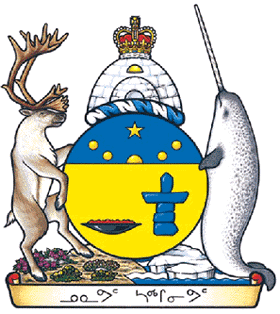 Cautious Hope and Optimism for Solving Nunavut's Suicide Crisis. Nunavummiut, especially those who have lost loved ones to suicide, may have felt hopeful about change after the territory's premier, Peter Taptuna, declared suicide in Nunavut a "crisis" in the legislature Oct. 22. The territory's chief coroner, Padma Suramala, and suicide researcher Jack Hicks - two key players in the recent coroner's inquest into Nunavut's high suicide rate - certainly feel hopeful too. Nunatsiaq Online Cautious Hope and Optimism for Solving Nunavut's Suicide Crisis. Nunavummiut, especially those who have lost loved ones to suicide, may have felt hopeful about change after the territory's premier, Peter Taptuna, declared suicide in Nunavut a "crisis" in the legislature Oct. 22. The territory's chief coroner, Padma Suramala, and suicide researcher Jack Hicks - two key players in the recent coroner's inquest into Nunavut's high suicide rate - certainly feel hopeful too. Nunatsiaq Online
Arctic Council, Indigenous Peoples, Prepare for Paris Climate Change Meeting. With less than a month to go before global climate change talks start in Paris, indigenous peoples and the Arctic Council are getting ready for the Conference of Parties, or COP 21, the 21st annual meeting of the nation states that make up the United Nations Framework on Climate Change. A commitment to limit the average global temperature rise to two degrees Celsius by the year 2100 through a binding agreement on cutting greenhouse gas emissions remains the goal of COP 21, which will see 40,000 delegates from 195 nations gather in Paris from Nov. 30 to Dec. 11. Nunatsiaq Online
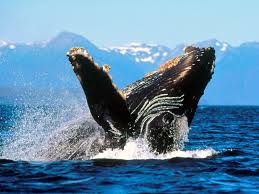 Oceanographers Find Whalesong in Arctic Waters. A team of researchers recording the sounds of whales in Alaska's Arctic have recorded humpback whales singing in the Chukchi Sea, something previously thought to happen only in tropical waters. Kathleen Stafford, an oceanographer at the Applied Physics Lab at the University of Washington, presented the discovery Monday at the fall meeting of the Acoustical Society of America in Jacksonville, Florida. Juneau Empire Oceanographers Find Whalesong in Arctic Waters. A team of researchers recording the sounds of whales in Alaska's Arctic have recorded humpback whales singing in the Chukchi Sea, something previously thought to happen only in tropical waters. Kathleen Stafford, an oceanographer at the Applied Physics Lab at the University of Washington, presented the discovery Monday at the fall meeting of the Acoustical Society of America in Jacksonville, Florida. Juneau Empire
Greenland Ice Sheet High Elevation: Not Melting Due to Soot or Carbon. While scientists have been aware in recent years that the ice sheet in Greenland appeared to be getting darker and seemed no longer to be reflecting sunlight back into space, a recent study from Dartmouth College found that the "dirty ice" or "dark snow" is not the result of soot or dust from forest fires or oil/gas pollution, but because of satellite sensors that have degraded and are showing inaccurate information regarding the ice. However, they noted that the findings of this study are only the case for higher elevations on the ice sheet. Nature World News
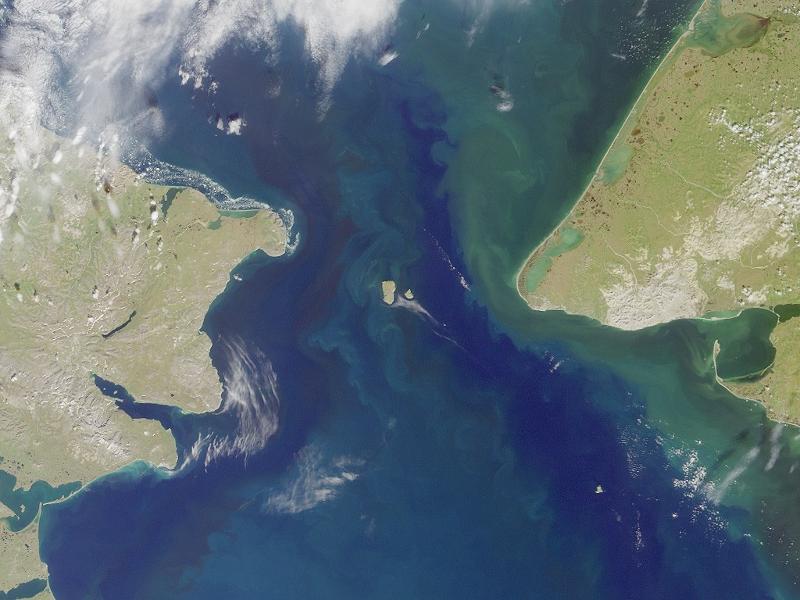 Feds Halt Alaska Deep-Draft Port Study After Shell Puts Offshore Drilling on Hold. Shipping in Arctic waters off Alaska has grown steadily in recent years, largely because of receding sea ice and until recently offshore oil and gas exploration. An average of some 420 vessels pass through the Bering Strait annually. And all that activity requires facilities to handle the ships and their crews. "You need a good port," Papp said, "a harbor of refuge. Someplace where you can get deep-draft ships into, a place where you can do logistics, resupply, and get out of the weather." KUAC Feds Halt Alaska Deep-Draft Port Study After Shell Puts Offshore Drilling on Hold. Shipping in Arctic waters off Alaska has grown steadily in recent years, largely because of receding sea ice and until recently offshore oil and gas exploration. An average of some 420 vessels pass through the Bering Strait annually. And all that activity requires facilities to handle the ships and their crews. "You need a good port," Papp said, "a harbor of refuge. Someplace where you can get deep-draft ships into, a place where you can do logistics, resupply, and get out of the weather." KUAC
A New Map of the Arctic? In the early months of 1846, a hundred and twenty-six sailors and officers, commanded by Captain John Franklin of the Royal British Navy, sailed south from their winter harbor on Beechey Island, in the Canadian Arctic. They went in search of the Northwest Passage, the fabled route connecting the Atlantic Ocean with the Pacific; what they found instead was some of the thickest sea ice in the world. Their two ships, H.M.S. Erebus and H.M.S. Terror, became trapped in Victoria Strait. After two winters on the ice, the survivors, weakened by scurvy, starvation, and lead poisoning from poorly canned goods, made a desperate break for the mainland. They died hundreds of miles from safety. Not until September of 2014 was the wreck of the Erebus discovered, at the bottom of Queen Maud Gulf; the Terror is still missing. The New Yorker
|
Legislative Action
No Arctic legislation was formally considered yesterday.
|
|
Future Events
Due North: Next Generation Arctic Research & Leadership, November 5-8, 2015 (Calgary, Alberta, Canada). The Association of Canadian Universities for Northern Studies (ACUNS) will convene an interdisciplinary conference of early career scientists working on Arctic issues. Topics will include: Arctic Communities, Arctic Sustainable Development, Arctic Wildlife, Ecosystem and Biodiversity, Arctic Food Security, Arctic Landscapes, Climate Change and Adaptation, Disaster Risk Management, Policy, Politics and Leadership, Arctic Environment (Data and Techniques), Arctic Resources, and Future of Arctic.
Matchpoints Seminar, November 12-13, 2015 (Aarhus, Denmark). The purpose of the conference is to provide a forum for policy-makers and academics to deliberate on how the security, resilience and sustainability of the globalized Arctic region and its peoples may be enhanced, and what instruments of governance may most suitably contribute. The conference will spell out (1) how the different relevant dimensions of security (military, economic, environmental, energy and human security) manifest themselves in the governing / governance arrangements in the Arctic; (2) how the challenges associated with each manifest themselves, individually and together; and (3) what forms of governing arrangements can best help to address the challenges. The conference will also focus on (4) how the Nordic countries and nations, including Greenland, the Faroe Islands and Aaland Islands, may contribute to the peace, stability and prosperity of the Arctic region through collaborative efforts based on their shared social, human, environmental and democratic values.
Arctic Circle Forum (ACF) Singapore, November 12, 2015 (Singapore). The event will be hosted by The Arctic Circle and Singapore Maritime Institute (SMI), with the support of the Singapore Government. The ACF Singapore will be opened by President of Iceland Ólafur Ragner Grímsson and Deputy Prime Minister and Coordinating Minister for National Security of Singapore Teo Chee Hean. Discussions will focus on a range of topics related to Arctic shipping, infrastructure financing, ocean science and research, as well as global collaboration on Arctic affairs. Among the speakers and participants will be Senior Arctic Officials, representatives of major shipping companies, investment funds, and scientific institutes from the United States, Europe, and a number of Asian states.
Arctic Observing Open Science Meeting, November 17-19, 2015 (Seattle, Washington). The Arctic Observing Open Science Meeting will be 2.5 days and held at the Hyatt at Olive 8 in Seattle, Washington. The conference will bring together individuals and teams involved in the collection, processing, analysis, and use of observations in the Arctic - from academia, agencies, industry, and other organizations. The meeting will be convened as a combination of plenary talks, parallel science sessions, and a poster session. The deadline for the Meeting Registration is Tuesday, 20 October. The agenda and registered attendees can be found on the meeting website.
In the Spirit of the Rovaniemi Process 2015, November 24-26, 2015 (Rovaniemi, Lapland, Finland).When the Arctic Environmental Protection Strategy, the so-called Rovaniemi Process, was adopted in 1991, it aimed at overcoming divisions and turning the zone of Cold War military tensions into a region of peace and co-operation. In this joint effort focusing on the protection of environment, and later, sustainable development, the Arctic states supported by indigenous organizations laid grounds for institutionalized collaboration and the emergence of Arctic regional identity. The second international conference will bring together decision-makers, scholars, artists, designers and students to address these questions and discuss the Arctic in global, regional and local perspectives.
Arctic Council and Beyond, December 4, 2015 (Ottawa, Ontario, Canada). This one-day conference hosted by The Northern Institute will focus on the role of the Arctic Council as a forum for Arctic cooperation, the place of the Arctic in Canada's foreign policy and approach to the circumpolar world, the role of the Arctic in global relations in light of the increasing interest in the region by European and Asian states, and the voice of Indigenous Peoples within the Arctic Council and in shaping circumpolar countries' Arctic policies.
Arctic Encounter Paris (AEP 2015), December 11-12, 2015 (Paris, France) (During the UN Convention on Climate Change - COP21). The Arctic Encounter Paris will take place at the French Senate at Luxembourg Palace and the 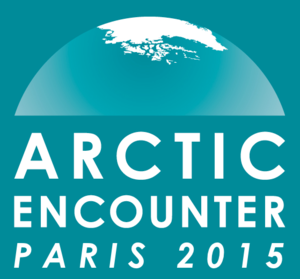 French Military College, École Militaire, in Paris, France, on the final days of the monumental United Nations Convention on Climate Change (COP21) where thousands of global citizens and government delegates will be gathered to deliberate the world's response to our changing planet in Paris. The AEP is the only Arctic policy side event currently planned to take place during the UN Convention. A reception will take place following the closing panel. French Military College, École Militaire, in Paris, France, on the final days of the monumental United Nations Convention on Climate Change (COP21) where thousands of global citizens and government delegates will be gathered to deliberate the world's response to our changing planet in Paris. The AEP is the only Arctic policy side event currently planned to take place during the UN Convention. A reception will take place following the closing panel.
 Fall meeting of the American Geophysical Union, December 14-18, 2015 (San Francisco, California). The 48th meeting of the union brings together nearly 24,000attendees, and lots of Arctic research results. The scientific program is here. There will be several Arctic-related "Town Hall" meetings, including those sponsored by NASA, DOE, NSF, ISAC, IARPC, and SEARCH. Fall meeting of the American Geophysical Union, December 14-18, 2015 (San Francisco, California). The 48th meeting of the union brings together nearly 24,000attendees, and lots of Arctic research results. The scientific program is here. There will be several Arctic-related "Town Hall" meetings, including those sponsored by NASA, DOE, NSF, ISAC, IARPC, and SEARCH.
This symposium is part of an ongoing initiative of the National Academies of Science Polar Research Board to expand public understanding of why the dramatic changes affecting the Arctic region ultimately matter to us all. The agenda features engaging presentations and discussions with top Arctic science and policy experts, and displays and interactive exhibits that illustrate Arctic change and its global impacts. The event is free and open to the public. There are sponsorship opportunities, and a call for exhibitor applications (by Oct.31, 2015). Audience space is limited, so register today; and please encourage your friends, neighbors, and colleagues to participate-as our goal is to reach well beyond the small circle of specialists who typically attend Arctic-themed events in the DC area. The U.S. Arctic Research Commission is helping to sponsor this event.
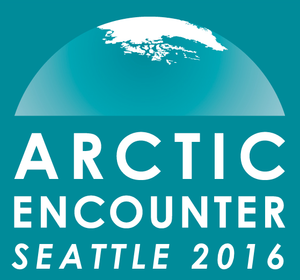 Building upon the preceding Arctic Encounter event in Paris, the third annual Arctic Encounter Symposium (AES) in Seattle, Washington will convene policymakers, industry leaders, and leading experts to confront the leading issues in Arctic policy, innovation, and development. As the largest annual Arctic policy event in the United States, the AES mission is to raise awareness, engage challenges, and develop solutions for the future of a region and a people. The two-day program includes two keynote luncheons, expert plenary sessions, break out sessions, a networking cocktail reception and seated dinner. A closing reception will take place at the conclusion of the program. Building upon the preceding Arctic Encounter event in Paris, the third annual Arctic Encounter Symposium (AES) in Seattle, Washington will convene policymakers, industry leaders, and leading experts to confront the leading issues in Arctic policy, innovation, and development. As the largest annual Arctic policy event in the United States, the AES mission is to raise awareness, engage challenges, and develop solutions for the future of a region and a people. The two-day program includes two keynote luncheons, expert plenary sessions, break out sessions, a networking cocktail reception and seated dinner. A closing reception will take place at the conclusion of the program.
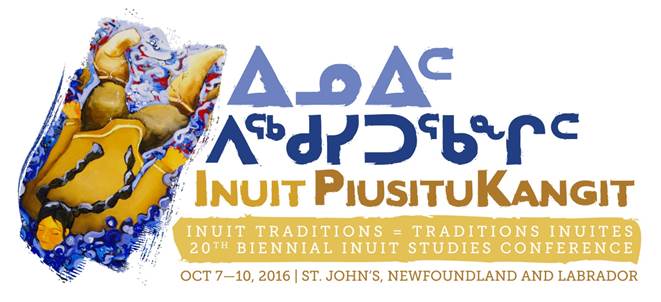 Inuit traditions are a repository of Inuit culture and a primary expression of Inuit identity. The theme for the 2016 Inuit Studies Conference invites Elders, knowledge-bearers, researchers, artists, policy-makers, students and others to engage in conversations about the many ways in which traditions shape understanding, while registering social and cultural change. The institutional hosts of "Inuit Traditions," Memorial University of Newfoundland and the Nunatsiavut Government, invite you to contribute to an exchange of knowledge to be held in St. John's, Newfoundland and Labrador, October 7-10, 2016. Presentations on all aspects of Inuit studies will be welcome. Inuit traditions are a repository of Inuit culture and a primary expression of Inuit identity. The theme for the 2016 Inuit Studies Conference invites Elders, knowledge-bearers, researchers, artists, policy-makers, students and others to engage in conversations about the many ways in which traditions shape understanding, while registering social and cultural change. The institutional hosts of "Inuit Traditions," Memorial University of Newfoundland and the Nunatsiavut Government, invite you to contribute to an exchange of knowledge to be held in St. John's, Newfoundland and Labrador, October 7-10, 2016. Presentations on all aspects of Inuit studies will be welcome.
|
|

  
4350 N. Fairfax Drive, Suite 510
Arlington, VA 22203, USA
External links in this publication, and on the USARC's World Wide Web site ( www.arctic.gov) do not constitute endorsement by the US Arctic Research Commission of external Web sites or the information, products or services contained therein. For other than authorized activities, the USARC does not exercise any editorial control over the information you may find at these locations. These links are provided consistent with the stated purpose of this newsletter and the USARC Web site.
|
|
|
|
|
|
|
|
|